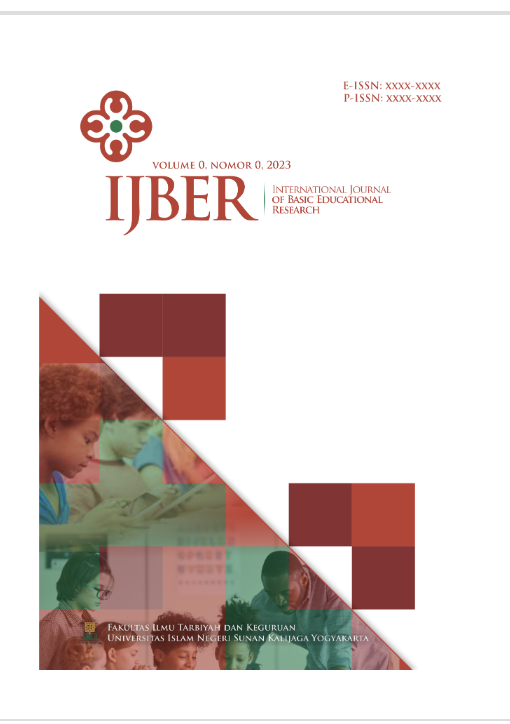Science Literacy Skills of Prospective Primary Education Teachers: Challenges in the 21st Century
DOI:
https://doi.org/10.14421/ijber.v2i01.9541Keywords:
Religious Education, Content Analysis, Ibtidaiyah Curriculum, Value Erosion, Educational ToleranceAbstract
The low science literacy ability for Central Java Province is certainly related to educational institutions that produce prospective science teachers. The better and more mature the preparations are made, the more professional the graduates are produced. The purpose of this study is to reveal the phenomenon that occurs in an Islamic university in Surakarta as one of the producers of prospective MI teachers. The aspects measured include the essence of science and how to learn science. The data analysis technique uses descriptive statistics. The findings of this research are distinguished from three major challenges, namely (1) Specialization in the scientific field starts from the selection of science courses that are less accommodating to pay attention to the tendency of interest of prospective MI teachers, (2) the determination of courses should refer to the acquisition of science literacy assessments nationally and the rankings of PISA and TIMSS Indonesia, and (3) It is necessary to provide more intensive debriefing to prospective MI teachers about professionalism competencies.
References
Balitbang Kemendikbud. (2019). Pendidikan di Indonesia belajar dari hasil PISA 2018. In Pusat Penilaian Pendidikan Balitbang Kemendikbud (Issue 021). Pusat Penilaian Pendidikan BalitbangKemendikbud. https://simpandata.kemdikbud.go.id/index.php/s/tLBwAm6zAGGbofK#pdfviewer
Chin, A. (2024). Confucius Chinese philosopher. Britannica. https://www.britannica.com/biography/Confucius
Collette, A. T., & Chiappetta, E. L. (1994). Science instruction in the middle and secondary schools (2nd ed.). Macmillan Pub. Co.
Creswell, J. (2015). Riset pendidikan: Perencanaan, pelaksanaan, dan evaluasi, riset kualitatif & kuantitatif (H. P. Soetjipto & S. M. Soetjipto (eds.); I). Pustaka Pelajar.
Direktorat KSKK Madrasah. (2021). Peringkat lembaga dalam kompetisi sains madrasah tingkat provinsi. https://ksm.kemenag.go.id/web/peringkatprovinsi
Indrawati, E. S., & Nurpatri, Y. (2022). Problematika pembelajaran IPA terpadu (kendala guru dalam pengajaran IPA terpadu). Educativo: Jurnal Pendidikan, 1(1), 226–234. https://doi.org/10.56248/educativo.v1i1.31
Kemendikbudristek. (2021). Kurikulum untuk pemulihan pembelajaran. In Pusat kurikulum dan pembelajaran. Badan Standar, Kurikulum, dan Asesmen Pendidikan Kemdikbud Ristek.
Munthe, B. (2013). Banyak cara mengajar (strategi mengajar). Adelia Grafika.
OECD. (2019). PISA 2025 science framework. OECD PISA. https://pisa-framework.oecd.org/science-2025/
OECD. (2024). Programme for international student assessment. https://www.oecd.org/pisa/
Republik Indonesia. (2005). Undang-undang nomor 14 tahun 2005 tentang guru dan dosen.
Reynolds, K. A., Erin Wry, I. V. S. M., & Davier, M. von. (2021). Education policy and curriculum in reading. IEA TIMSS & PIRLS. https://pirls2021.org/encyclopedia/
Sari, M. (2013). Problematika Pembelajaran Sains Ditinjau Dari Aspek Guru. Al-Ta Lim Journal, 20(1), 346–356. https://doi.org/10.15548/jt.v20i1.30
Sari, R. (2017). Paradigma scaffolding : Alternative pembelajaran sains sebagai stimulus siswa sadar Linkungan di SDIT Lukmanul Hakim Langsa. BioLink: Jurnal Biologi Lingkungan, Industri, Kesehatan, 4(1). https://doi.org/10.31289/biolink.v4i1.963
Sari, R., Nuraida, N., & Rizki, S. (2017). Think pair share: Alternatif peningkatan aktivitas dan hasil belajar IPA. PeTeKa (Jurnal Penelitian Tindakan Kelas Dan Pengembangan Pembelajaran), 1(1), 41–47.
Sugiyono. (2023). Metode penelitian pendidikan (kuantitatif, kualitatif, kombinasi, R&D dan penelitian pendidikan) (A. Nuryanto (ed.); 3rd ed.). Alfabeta






